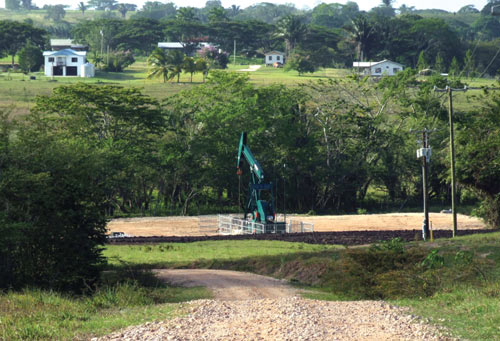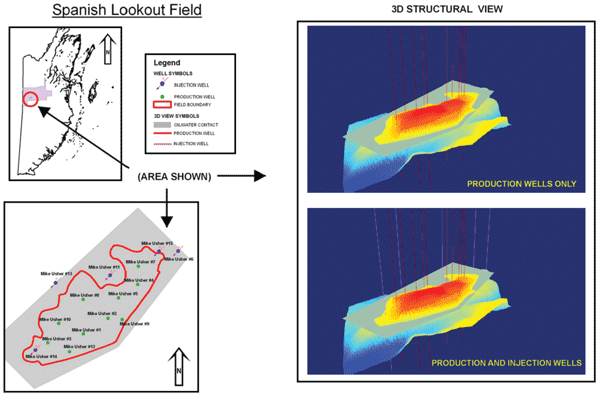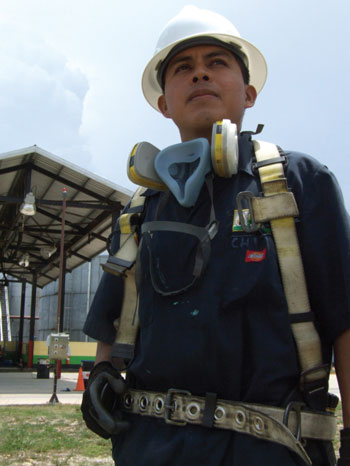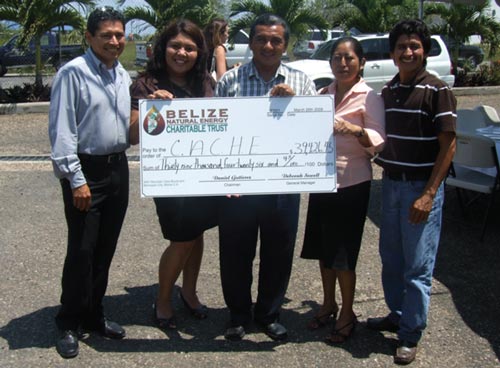
Independents International
Independent Finds Right Fit In Belize
By Susan Morrice
BELMOPAN, Belize–Global giants in the international crude oil exploration, drilling and production industry tend to enjoy advantages when it comes to economies of scale and easy access to funding. But it is becoming clear that in the hunt for frontier oil, those advantages may be no match for the nimble agility and persistent mindset of small independent explorers and producers.
More and more, developing countries are choosing independents as they shift toward more holistic partnerships.
The founding of independent oil company Belize Natural Energy is a case in point and tells the story of a partnership that created a triple-win for a country, its people, and those who risked the original investment. But it also is about the catalytic effect that the discovery and production of oil had on the latent entrepreneurial spirit of the Belize people.
The Dream
When I met my future business partner and native Belizean, Mike Usher, I knew that if we could find oil in Belize, we could transform the nation for the benefit of all. It was Mike’s determination to follow his dream that encouraged us to continue searching for oil in Belize, even after 50 companies had drilled 50 years of dry holes and invested millions of dollars in failed exploration. We knew, however, that if we could find oil, it would lead to an increase in international investment in Belize, new revenues for the government, and a higher standard of living for all Belizeans.
Belize Natural Energy discovered light crude oil on its first exploration well drilled in the Spanish Lookout Field, the Mike Usher No. 1, in summer 2005. There now are 10 Mike Usher wells producing in the Spanish Lookout Field, the first commercial oil field in Belize.
After 15 years of unsuccessful searching, we, too, thought we were doomed to go the way of the 50 oil companies. Usher’s unrelenting enthusiasm aside, what was echoing in my head was a pearl of wisdom I had garnered many years earlier from a speech made by a senior leader at Shell Oil Company, who said, “Oil is found in the minds of men.” That phrase was coined by famed U.S. petroleum geologist Wallace Pratt, who was one of the founders of the American Association of Petroleum Geologists.
It wasn’t until 2002, while I was attending a seminar run by an organization called Educo (Latin for “to draw out from within”) that I really discovered the importance of Pratt’s wisdom. Increasing the focus of the mind will yield powerful results. After understanding this, discovering oil in Belize suddenly seemed much more attainable. Such was our conviction we would discover oil there, that we founded Belize Natural Energy (BNE).
Perseverance
As a small, independent exploration company, we faced a formidable constraint: capital. The industry was not prepared to invest any more money for oil exploration in Belize. Undaunted, we turned to those who had attended the Educo seminar and understood Dr. Pratt’s concept. The initial investor group consisted of more than 75 members from Ireland, the United Kingdom, United States and Belize.
We presented a business model to the Belize government that offered a true triple-win partnership. Tax revenues generated from the oil would help the government balance its budget and deal with mounting debt. A separate stream of funds would be set aside to create a trust dedicated to helping people help themselves in the areas of education and social environment. Finally, the investors in BNE would be able to realize a fair return.
At the time, there had been only three exploration licenses given in Belize, and none was active. The government understood the need to attract foreign investment to develop its natural resources, so it granted BNE an onshore license for almost 470,000 acres.
We now had a block of land comparable in size to half the state of Rhode Island, but only enough capital to conduct limited seismic and drill two wells. Somewhere in this vast acreage, we would have to choose where to drill two 20-inch, 4,000-foot-deep holes with the slimmest chance of discovering oil–truly a needle in a haystack. We commenced drilling in May 2005, and on June 24 we discovered light crude.
As those in the energy industry know, on a good day it generally takes 10-15 exploration wells before any oil is found. We discovered light crude on our first attempt. My only regret was that my great friend and business partner, Mike Usher, never lived to see our dream come to fruition. Mike passed away on June 24, 2004, exactly one year before the discovery of Belize light crude. We named the discovery well the Mike Usher No. 1. There now are 10 Mike Usher wells that make up the Spanish Lookout Field–the first commercial oil field in Belize.
A Holistic Approach
Then a second unbelievable thing happened. Belizeans started showing up with their own trucks to transport the crude over the Maya Mountains to the Big Creek Banana Port. These truckers were the “green shoots” of entrepreneurism generated by BNE’s discovery. In spite of operating in a frontier nation with no oil industry infrastructure or experience whatsoever, BNE managed to export the crude to the U.S. Gulf Coast within six months because of Belizean entrepreneurship.
BNE continues to add to its knowledge of the Spanish Lookout Field through 3-D structural view technology.
At that point, we realized we had witnessed a byproduct of our holistic approach: oil igniting the entrepreneurial spirit of the local community. As an independent oil company, we didn’t have economies of scale and vast funding, but we were successful nonetheless because we were agile enough to adapt to a difficult situation and make the most of the triple-win partnership that existed at the heart of our business model.
As the BNE team grew, we had our third piece of good fortune. In September 2006, Belizean engineer Gilbert Canton agreed to take on the role of chief executive officer. Over the following four years, he has proven to be an inspirational and effective business leader, and has demonstrated phenomenal commitment to the company’s mission. He also has become something of an ambassador for BNE, presenting the holistic model in Houston, Trinidad, Brazil, and soon in Panama.
This holistic business model embraces International Finance Corporation performance standards for social and environmental management, whereby almost all senior managers are locals, approximately half of senior managers are women, and taxes are a vital component of government revenues. We believe this model is ideal for frontier countries that seek sustainable success.
As if finding one commercially producing well wasn’t success enough, our persistence paid off again with a second discovery at our Never Delay site, which was declared commercial in November 2009. Discovering a second commercial field strengthens our conviction that there are many more barrels of undiscovered oil in Belize, and that the best years of the country’s oil industry are ahead of it.
To date, BNE has drilled 10 producing wells in the Spanish Lookout Field, generating 4,600 barrels of light crude oil production a day. The field has proven reserves approaching 11 million stock tank barrels. In the Never Delay Field, we have almost 4 million barrels of reserves. BNE remains committed to diligently exploring its license block, using the latest seismic technology and drilling methods, including investing in a new Schramm TXD Rotadrill from a manufacturer in Pennsylvania.
Impact On A Nation
The economic impact on the country of Belize has been profound. The most recent External Trade Bulletin, published in November by the Statistical Institute of Belize, reported that crude oil sales accounted for more than one-fourth of the nation’s export earnings. Through taxation, royalties and production sharing, the Belizean government has earned a significant stream of revenue, which has led to BNE becoming the single largest contributor to the government’s tax revenues.
In addition, and as part of our holistic approach to long-term sustainability, BNE and the Belizean government formed the Belize Natural Energy Trust. The trust was officially launched in March 2009, and since has built and furnished a public library and classrooms in different areas of the country. It has partnered with volunteers to develop youth camps and other training programs, and has invested in the future of Belizean citizens by providing student loans through local credit unions.
A key to Belize Natural Energy’s success is a holistic model for oil and gas exploration that created a triple-win partnership for a country, its people, and those who risked the original investment capital. A uniformed BNE employee is shown here on a well location in Belize.
The trust is working toward creating a microlending facility to induce further entrepreneurship. Thus far, the fund has been allocated more than $2.5 million to support environmental and educational programs. The benefits realized from the initiatives carried out by the BNE Trust are everyday examples of the triple-win partnership.
Apart from direct financial contributions, BNE fosters upstream and downstream commercial development. We provide employment opportunities and vendor contracting, and attract other foreign direct investment. We have prepared a plan to make butane available at more affordable prices, and are working with different stakeholders and the government to bring this plan to fruition.
We have been quick to react to national disasters, and have supported people and communities in their efforts to rebuild their lives and communal spaces. These efforts, among the many other things BNE does, combined with direct financial contribution through taxation and funds committed to the BNE Trust, substantially benefit the citizens of Belize.
Conclusion
Sixteen years ago, I worked with AAPG to architect the first “international pavilion” in Denver. Because of my international experience, I was utterly convinced that pent-up potential existed for matching countries and their untapped reserves with oil and gas exploration companies that had the resources to develop them.
AAPG backed my hunch in a one-off experiment in 1994 that was so successful, 51 countries showed up and many marriages of interest resulted. Every year since, the IP event is inked into the international oil and gas calendar with more than 100 countries participating.
Marrying sovereign national interests with international oil and gas resources has been a passion of mine ever since. What happened in Belize, far from being a stroke of random good luck, was a deliberate matching of instinct and expertise on the one hand to opportunity and resources on the other.
The Belize Natural Energy Trust was created through an agreement between BNE and the government of Belize to fund educational and environmental initiatives. The trust is co-managed by the Belizean government and BNE. Shown here is a check distribution from the trust.
Small countries at the frontier of increasingly scarce oil and gas reserves are rightly seeking advantages for their people that go beyond the conventional exploration and production deal. The changing paradigm is, for once, shifting in favor of the more agile and less intimidating independents in our industry.
The BNE model is not a cookie-cutter solution. It is a custom-made business model for a sovereign nation that wants to bring long-term sustainable benefits to its people through a symbiotic partnership with those who have the resources and expertise to invest in developing its natural resources.
The holistic BNE model–based on the principles of sustainability and trust–has proven robust. The strong free-market traditions inherent in Belizean society, coupled with smooth and democratic political transitions, are fertile ground for oil and gas exploration and production.
I have been approached by other frontier countries eager to adopt the BNE model to their own oil and gas resources. The leaders of these nations understand that BNE’s model offers the added value of inducing entrepreneurship–the oil well in people’s minds–in addition to the new revenue from production that can help ease their national debts. They, too, want the triple-win of a sustainable partnership among government, people and investors.

SUSAN MORRICE, who serves as a director and chairman of Belize Natural Energy, was awarded the American Association of Petroleum Geologists’ Distinguished Service Award for her leadership in organizing the International Pavilion project. The pavilion project brought together 51 countries, their ministers of energy and teams to enable them to exhibit their oil and gas potential to the international AAPG. She has worked as a geological consultant in places such as China, the Philippines, Algeria, Morocco, Turkey, Italy, Spain, Ireland and the United States. Morrice graduated with a degree in geology from Trinity College in Dublin, Ireland.
For other great articles about exploration, drilling, completions and production, subscribe to The American Oil & Gas Reporter and bookmark www.aogr.com.










